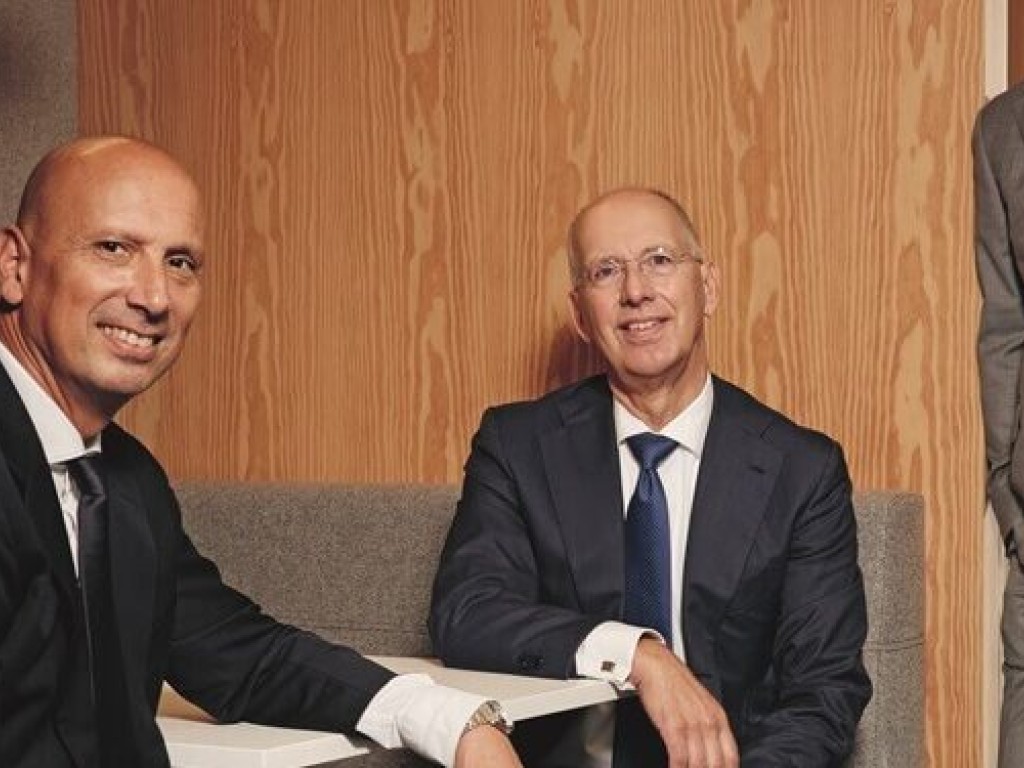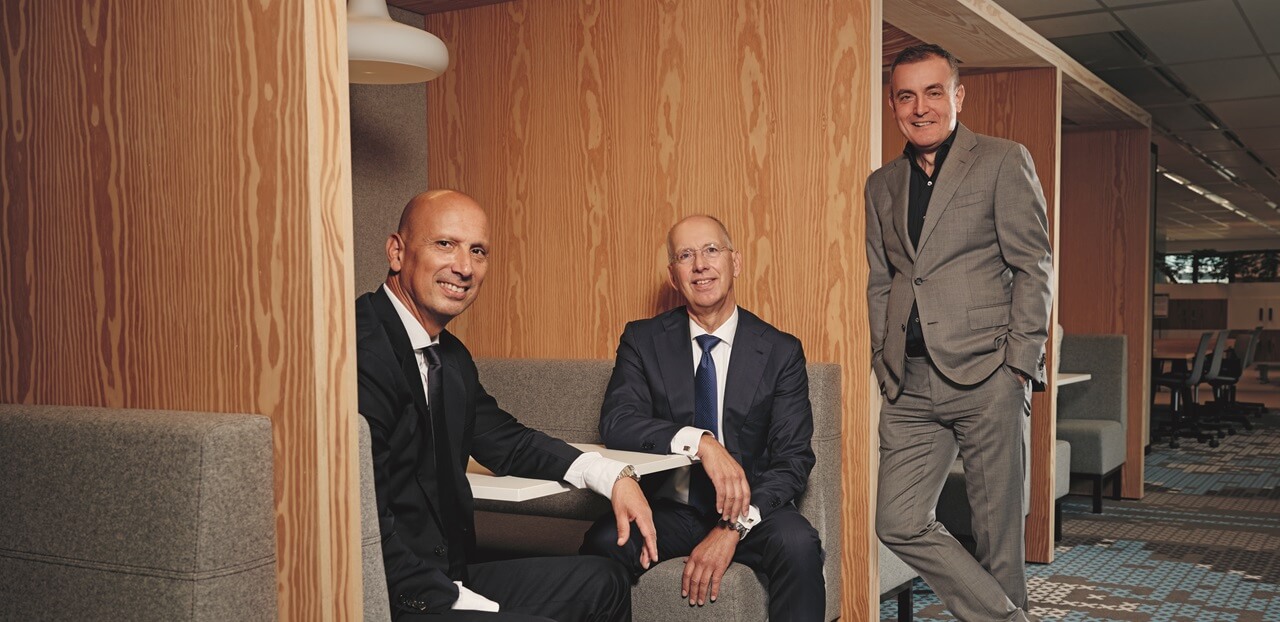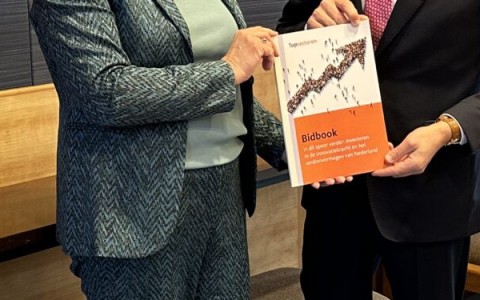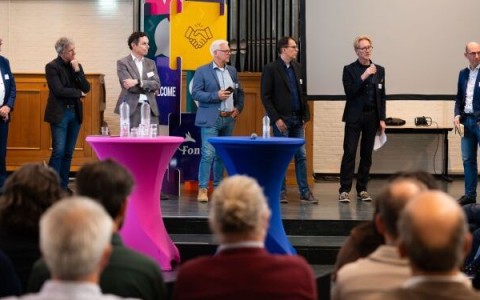Ronald Paul and Tjark Tjin-A-Tsoi: 'Don't stifle innovation'


Logistics has many challenges as well as an overarching problem: the public-private cooperation that is supposed to move the sector and the Netherlands forward is faltering due to a lack of decisiveness. The lack of innovation is a threat to our prosperity, according to TNO CEO Tjark Tjin-A-Tsoi and figurehead of the Top Sector Logistics Ronald Paul. They call on the government and industry to be more daring. 'We in the Netherlands are not able to follow through. Execution power needs to rise sharply.'
Undervalued and indispensable - there is hardly any awareness that logistics facilitates our prosperity. 'When you think about it, it's amazing how smoothly the logistics machine runs. All those shops and restaurants in big cities, they all need to be supplied. And that goes well every day - without central control. Even in metropolises.' Tjin-A-Tsoi , ceo of TNO, describes the efficient way of working as a triumph of logistics. But dark clouds hang over the sector, agrees Ronald Paul, figurehead of the Top Sector Logistics. 'The Netherlands has been among the world's top logistics countries for years. We must make serious efforts to maintain that position.'
Since 2009, the government has been pursuing a top sector policy. Ten top sectors in which the Netherlands excels have been identified, which should strengthen the economy with extra attention and investment. The aim is for knowledge institutes, business and government to work together within these industries to boost innovation. The top sectors focus on chemistry, food & agri and energy, among others. And so there is also a Top Sector Logistics that focuses on resilient, sustainable and resilient logistics. As a knowledge partner, TNO is closely involved in all top sectors; some 25 programmes have already been developed with the Top Sector Logistics.
Tjin-A-Tsoi and Paul reflect on the many challenges of the industry that accounts for 14 per cent of our GDP and employs some 1.3 million people. They agree on what is lacking in the public-private partnerships that are supposed to move the sector and the Netherlands forward: lack of decisiveness. A problem not just in logistics, but more broadly, they tell Johan Kerver, mt-member of evofenedex, the entrepreneurs' association with more than 10,000 members in trade & logistics.
What are the biggest challenges for the transport & logistics sector?
Paul: 'First of all, geopolitical developments create uncertainty. Admittedly, our logistics is robust. For instance, consumers hardly noticed the Suez Canal blockade in 2021, when container ship the Evergreen ran aground. Similarly, the current tensions in the Red Sea have so far had little impact. Ultimately, Dutch logistics may be affected. Secondly, the energy transition brings not only opportunities but also quite a few challenges. Logistics play a key role in that transition, as well as in transporting the circular economy. We won't have it sorted out tomorrow.
Tjin-A-Tsoi: 'That our logistics are vulnerable due to geopolitical tensions does not come out of the blue. Europe has moved the bulk of production capacity elsewhere. We have become dependent on China in particular for production, but also for critical materials essential for the energy transition. Also, the war in Ukraine casts a shadow over our country. It could have unpleasant consequences for the port of Rotterdam and the road network. From a security perspective, we need to prepare for this.
I signal more challenges. First, billions of euros are needed for infrastructure investments, according to a recent TNO report. Only with improvements to roads, bridges, viaducts and railways can logistics sustain the expected 20 per cent growth. Without these investments, congestion threatens, which will inhibit growth. Second, there is a need for smarter logistics to make road use more efficient. There is - with modern ai technologies such as autonomous driving and even better planning and coordination, we can transport more with fewer means of transport. Only, such innovative solutions are not getting off the ground because regulations and environmental issues, among others, are a barrier. Finally, a big challenge is the sustainability ambition. The sector must both grow and become more sustainable. But pursuing these conflicting goals is not easy; it soon leads to stagnation.'
How urgent is the situation?
Paul: 'I emphasise that it is not five to, but five past twelve. The government is currently focusing on maintaining our infrastructure. That is good to clear the backlog of maintenance. However, the Netherlands must also invest heavily in expansion and improvement to facilitate future growth and sustainability. This is not just about roads, rail and inland navigation, but also about our electricity grid. This is already overloaded and inhibits business activity and our business climate If we are not careful, our roads will clog up. Various models indicate that without investment, we will soon be stuck in traffic jams from morning to night. The top sector is committed to making better use of existing infrastructure and investing in innovation. This is badly needed because funds for actual new infrastructure are limited.'
Tjin-A-Tsoi: 'I note that a lot of plans are not getting off the ground due to excessive regulation, slow decision-making and limited room for experimentation. This is a big problem. Nowadays, any stakeholder with the law in hand can veto through the courts. Think of our ambition to grow into a hydrogen economy - the implementation of the network for that is simply too slow. Or take the nitrogen issue. The law is drafted in such a way that the nitrogen interest pushes aside all other interests.'
How is the Logistics Top Sector structured and how can it contribute to the various challenges?
Paul: 'The Logistics Top Sector falls under the Ministry of Economic Affairs and the Ministry of Infrastructure and Water Management. We drive cooperation between government, industry and knowledge institutions. And we also co-invest in the joint programmes. It is crucial here that innovations eventually land with the business community, otherwise you only have a nice report for on the windowsill.
We are keen to find solutions, within the strict laws and regulations and often limited financial resources, that allow us to make the sector more sustainable and competitive. For example, with the Joint Corridors Off-road programme, we are ensuring that millions of containers are no longer transported by road, but by rail or inland navigation. TNO is also involved in this. We also developed a measurement programme for the construction industry to combat nitrogen problems. On construction sites, thanks to real-time measurement programmes, we discovered that construction equipment is much less in use than thought. While models assumed continuous loading, in reality it was several hours a day. The insights led to a 30 per cent reduction in estimated nitrogen emissions. Municipalities now use these calculations when assessing building permits. This opens doors for projects that would probably have stalled before.'
Why is TNO a partner of the Top Sector Logistics?
Tjin-A-Tsoi: 'The purpose of top sectors is to be a powerful tool to give strong industries and sectors a push . It aligns with our mission to take innovation to the next level. We cooperate with all 10 top sectors. With the Top Sector Logistics, we have about 25 programmes running. We support innovation, do research on issues of interest to the sector, and also help with "orchestration" - getting different parties together to run projects.'
What could be better about private-public cooperation?
Tjin-A-Tsoi: 'Execution power needs to rise sharply. We in the Netherlands are unable to follow through. Due to the sometimes limited policy space, we fail to balance different interests. But we should. There are situations in which we have to set priorities. Although we have a good strategic location and possess the right knowledge and resources, much remains unfinished due to the lack of execution power and integrated policy. Countries that are capable of doing so, like South Korea, are experiencing enormous growth.'
Paul: 'I am also experiencing a decline in strength. This is also because the level of knowledge in various ministries is declining and decision-making is therefore too cautious. As a top sector, we can assist the civil service to fill those knowledge gaps. We would also like to do something about the negative image surrounding logistics. It is worrying that on TV talk shows, unfounded criticism is voiced by people without knowledge. For instance, there is discontent in society about so-called dumbing down, an ugly word referring to the construction of large distribution centres along motorways. In reality, they account for only 0.14 per cent of outdoor space. This seems more so because the buildings are mostly along motorways - locations that are more desirable than in cities. There is another important nuance: these centres serve almost 75 per cent of Dutch consumers. So they are not just international transit, as is often thought.
Is the current public-private partnership sufficiently robust to maintain innovation?
Tjin-A-Tsoi: 'It needs to be many notches better. Besides increasing execution power, we spend too little on innovation in the Netherlands. Currently, we put about 2.3 per cent of GDP into innovation, whereas according to the Lisbon standard it should be at least 3 per cent. That amounts to about €7 billion. And that every year. Not only the government but also Dutch businesses spend relatively little on innovation. We can't blame companies for that. For instance, the Dutch investment and business climate has not improved in recent years. Many large companies with R&D departments have left. The bulk of spending on R&D is done by the three largest companies.'
What would be your message to big companies?
Tjin-A-Tsoi: 'Make R&D a more explicit part of your business strategy, otherwise you will soon be overtaken. A relatively small part of Dutch business is innovating robustly, while the bulk of companies have been innovating too little for decades. This is reflected in the low productivity growth in certain sectors. In the long term, this is a threat to our prosperity. We need to work across the full breadth of the Dutch economy, including SMEs, to increase innovation power'.
What role can the government play in stimulating innovation?
Tjin-A-Tsoi: 'The government can be an important booster. The problem is that the procedures for government grants are often very long and sometimes unnecessarily so. The lead time is too long for rapid innovations. When the money for innovation becomes available, sometimes only after three years, the market and thus the competition is already many strokes ahead. European grant applications, by the way, are also a considerable challenge to submit.'
Paul: 'Indeed, the governance around incentives does not suit the fast-paced nature of innovation. The complexity of grant applications does not work for smaller companies. An SME cannot afford a tonne to submit a proposal. That one is worried about next week's cash flow.'
Tjin-A-Tsoi: 'You would want funding to be available more quickly and to be put into riskier projects. But that is not consistent with the risk aversion of the government, which has to be efficient and lawful with taxpayers' money. You can ask whether the government should be the only party, or whether we should also look at other private parties.'
How can private capital stimulate innovation?
Tjin-A-Tsoi: 'In the Netherlands, we traditionally put a lot of money into academic and basic research. But that is only the beginning of the innovation chain. There is a big gap between research and creating companies that shape the new economy. This is called the Valley of Death - many promising technologies fail due to lack of money. Venture capital plays a role here. But the Netherlands, like the whole of Europe, is severely undercapitalised in terms of venture capital compared to the United States. The Netherlands' largest capital is tied up in risk averse pension funds. Part of that 1,600 billion euros should be made available for riskier investments. TNO's new strategy is to collaborate more with venture capital and pension funds so that startups can grow. So we now also support startups outside the organisation. The aim is to create a more favourable climate for startups as well as scale-ups, which need both capital and knowledge.'
What would you like to change to strengthen the innovation power in the Netherlands?
Paul: 'That we show more guts. It's a message to both government and business. I think, for example, of the growth fund proposal Digital Infrastructure Logistics. For a long time, it did not succeed well in getting SMEs to move, now there finally seems to be more momentum for this.'
Tjin-A-Tsoi: 'I advocate legislation that provides sufficient "regulatory space" so that innovation is not nipped in the bud. Illustrative is the genesis of Silicon Valley. In the 1970s, there was no vibrant ecosystem there with startups and innovative hubs. That changed when the so-called prudent man rule that applied to pension funds was abolished. Under this rule, pension funds were not allowed to invest in risky investments. Suddenly, a considerable sum of money was freed up for what came to be called venture capital. It gave a huge boost to the development of Silicon Valley. Of course, other factors were at play. I also realise that pension funds have responsibilities of their own. But a discussion on removing barriers to stimulate innovation and growth seems sensible to me.'
Interview by Johan Kerver
Published in Management Scope 09 2024


